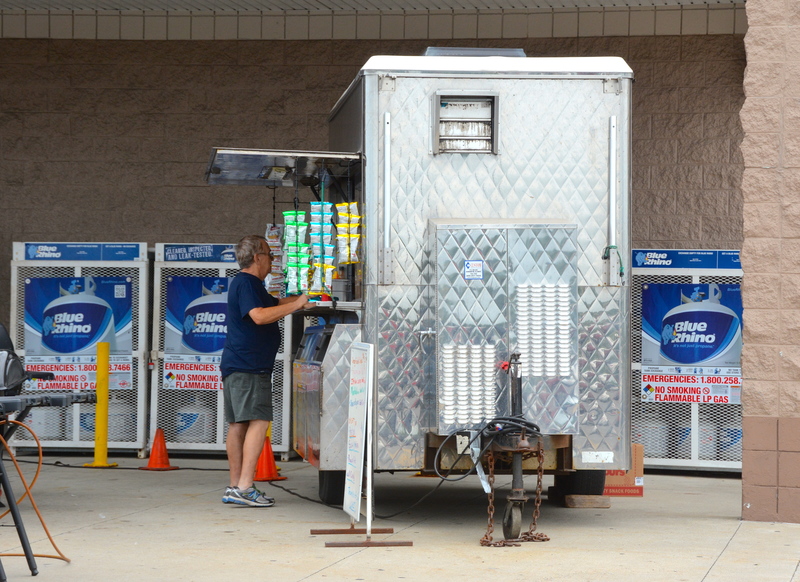Anyone who wants to open a hot-dog cart in unincorporated areas of Sussex County may need a site plan, two public hearings and more than $1,000 to cover county fees.
County officials – including legal staff – say the cost is exorbitant, and the process should be streamlined.
In addition, there is a growing trend of illegal vendors setting up shop as well as produce stands operating without county approval, said County Administrator Todd Lawson during county council's Aug. 12 meeting.
He asked council for direction to possibly amend county code to deal with the issues.
County code requires some hot-dog cart vendors to file for a $500 conditional-use application. That does not include other costs the applicant might incur for a survey or site plan. In some cases, legal fees are required, driving up the cost.
Selling food, produce or other goods – even in a commercial area parking lot with permission from the property owner – could require a variance, site-plan review or even a conditional use, as several hot-dog vendors in eastern Sussex have discovered, including one at Lowe's near Lewes. The owner was granted a conditional use in 2002.
Lawson said according to current county code mobile food carts in commercial parking lots could end up in the county land-use system with the owners shelling out thousands of dollars to receive county approvals.
Councilman Vance Phillips, R-Laurel, and Councilman Sam Wilson, R-Georgetown, said the county should not be in the business of regulating vendors on private property in commercial areas, such as large shopping center parking lots where vendors have permission from the property owner to set up shop.
“We are making it harder and harder for the little guy making a buck,” Phillips said.
“We need a simpler, more practical and not so costly process,” said Councilwoman Joan Deaver, D-Rehoboth Beach.
Some vendors ignore county code
On the other hand, the county is seeing an increase in vendors who show up – especially on weekends – without permission and set up shop in parking lots or vacant lots along major roadways. Deaver asked Lawson what the county does about those vendors.
“We chase them when we can,” he said. “Some have thumbed their noses at county code, and some have followed all regulations.”
He admitted that while the county has the authority to shut down an illegal vendor down – and even take them to court – that process has not occurred in the four years he has served as county administrator. He said the county has responded to complaints of illegal vendors, and county inspectors have investigated cases they have witnessed.
Phillips said he was under the impression that enforcement of county code was still a complaint-driven process. He said if no one complains about a vendor, the county should not get involved. “Step one is for us to return to a 100-percent complaint-driven policy,” he said.
Deaver asked if the problem was becoming serious.
“It boils down to how far the county wants to regulate them,” responded Vince Robertson, assistant county attorney.
“We are asking for direction from council,” Lawson said.
Trend of illegal produce stands, signs
Lawson said illegal produce stands and illegal signs are sprouting up throughout the county.
County code allows farmers or residents to sell produce on their property that they grow themselves on their property. Lawson said sales are restricted to seasonal produce sold for no more than six months. “The majority of stands are completely legal, but we are seeing more and more that are not legal,” he said.
Legal stands do not require any permit from the county. But stand owners selling produce that they have purchased elsewhere must have either a conditional use permit or commercial zoning.
The proliferation of signs leading to and around some produce stands also violates code, Lawson said. Stand owners are restricted no more than three signs.
It's a matter council members are close to. Three council members have had family members with produce stands or their own produce stands.
Councilman George Cole, R-Ocean View, who once sold produce in Fenwick Island he purchased from farmers in western Sussex County, said there is a need to streamline the process and create a level playing field in the process.
He said it's not fair for one vendor to follow county regulations and go through the process while another does not. “It's about the guy who paid all the money to do it right versus the guy who hasn't who could be taking money out of other vendors' pockets,” Cole said. “Regulations across the board need to be even for all.”
After listening to the discussion, Lawson said he would meet with the planning and zoning staff and come back at a future meeting with recommendations for possible changes to the code.
























































